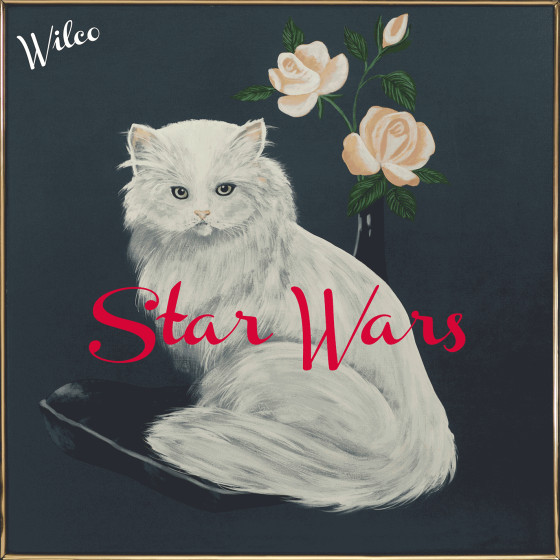Wilco : Star Wars

It makes sense that Wilco’s eleventh album just kind of showed up on your smartphone last week (albeit with a voluntary download, which is better than what U2 managed last year). In my case I was at a work function, checking Facebook, when I got this picture of a modestly interested Persian cat painted against a vase of roses, very similar to the kitschy paintings they used to put on velvet, with the sentimentally contradictory, laugh-out-loud title Star Wars splashed across in a red, ’50s Italian restaurant font. (“I get it,” my wife said of the cover. “It’s a summation of the Internet.” I definitely married up.)
This is a rare case—although such cases aren’t getting rarer—where the chosen method of distribution of an album seems to have as much to do with why it’s here as the music it contains. Star Wars is the loosest, maybe most impulsive album Wilco’s ever made, and probably the purest. Coursing off bending, abrasive guitar and muted rhythms, it takes a few listens to get past the obfuscations before you realize it’s Wilco in there. You know where things are headed with the opening instrumental “EKG,” an abrasive jolt that pits atonal electric guitar against steady but center-less acoustic guitar. It’s probably how the suits at Reprise thought Yankee Hotel Foxtrot sounded like, because they were in suits. It’s also over in less than 80 seconds. From there Wilco manages a sound that’s elastic and occasionally obscured. “More…” loops around a schizoid drum pattern and a loping glam riff, until they decide to crash the whole thing in a bed of white noise.
The same thing happens with “You Satellite”: Jeff Tweedy slips into a quiet voice, mixed way down low, junior-high electric strums coming out of one speaker and ringing chimes melting from the other. Drummer Glenn Kotche follows along with with jazz-like inexactness. Jeff splits from traditional verse structure, revealing himself as deliberately as the song is building. Four minutes later the resolution comes with Glenn scraping against his cymbals as a menacing low frequency slips into the middle. Then it just drops away.
It’s the elastic, uncentered guitars by Tweedy and Nels Cline that win out the first half of Star Wars. They’re stuck in suspension between riffs and experimental spray that steer recognizable tracks like “Random Name Generator” and “The Joke Explained” into off-track territory, toppling whatever adult contemporary expectancies you might have mistakenly picked up from Wilco (The Album). But when the anchoring Wilco structure finally shows in earnest—which will take a few listens—they gain context and sound like they belonged there all along.
Star Wars’ quieter second half nominally resembles what most of our frontal lobes would consider “usual” Wilco, but it’s hardly a settled affair. “Taste the Ceiling” is a typically comforting Tweedy melody, with tendrils of guitar squeaks dropped in for variance’s sake. But the album’s most dramatically deconstructive sequence starts with “Pickled Ginger,” Tweedy hunkering in low tones over a smashed classic rock riff heavy on the low frequencies. (“No one tells me how to behave/I’m born and I go to the grave” Tweedy sings.) By the end the mood’s changed entirely as a compressed Southern rock stomp, until it abruptly cuts off. The sad finality of “Where Do I Begin” carries Tweedy over a mournful Crazy Horse melody, but gives its final minute to a clash of backwards drum reverb and more noticeably detuned guitars. “Cold Slope,” “King of You” and “Magnetized” all play with sudden silences and clipped echoes, with Tweedy keeping his vocals in subdued check, measuring his impositions like hesitant admissions.
They’ve certainly made more direct albums with fewer layers, but when everything’s put away Star Wars might be the Wilco work that tells us more about them than any other, simply because there’s a lot here that we haven’t had to process yet. After a couple of confronting listens, Tweedy’s intent settles in like sediment through amber: You see the shape but have to keep looking closer each successive time, if you’re willing. In that manner Star Wars almost demands repeated listening sessions, and if that’s the case, this may be the greatest return on one’s capital investment in music history, depending on what Mozart charged.
Similar Albums:
 Tweedy – Sukierae
Tweedy – Sukierae
 Loose Fur – Born Again in the USA
Loose Fur – Born Again in the USA
 Phosphorescent – Muchacho
Phosphorescent – Muchacho
Paul Pearson is a writer, journalist, and interviewer who has written for Treble since 2013. His music writing has also appeared in The Seattle Times, The Stranger, The Olympian, and MSN Music.

